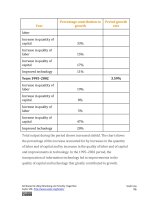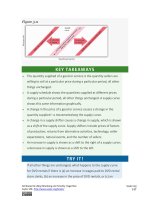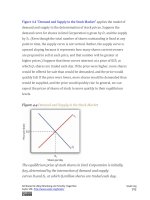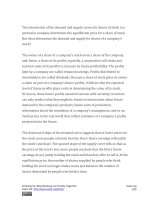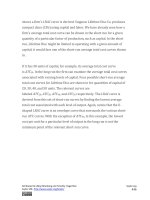Authors libby rittenberg 197
Bạn đang xem bản rút gọn của tài liệu. Xem và tải ngay bản đầy đủ của tài liệu tại đây (384.95 KB, 1 trang )
Case in Point: 9/11 and the Stock Market
The hijacking of four airplanes and the steering of them into buildings is
perhaps the only disaster that has become universally known by its date:
September 11, 2001—hence, 9/11. “9/11” will remain etched in our
collective memory for a great many generations.
Disasters such as 9/11 represent the kind of complete surprises that
dramatically affect stock prices, if only temporarily. The New York Stock
Exchange was closed on the day of the attack and remained closed for six
days. On the day the market opened, the Dow Jones Industrial Average (the
“DOW”, a widely used gauge of stock prices) fell nearly 685 points to 8,920.
It was one of the biggest one-day decline in U.S. history.
Why did the attacks on September 11, 2001, have such a dramatic shortterm impact on the stock market? The attacks of 9/11 plunged the United
States and much of the rest of the world into a very frightening war against
terrorism. The realization that terrorists could strike anytime and in any
place sapped consumer and business confidence alike and affected both
the demand and supply of most stocks. The attacks on 9/11 provoked fear
and uncertainty—two things that are certain to bring stock prices down, at
least until other events and more information cause expectations to
change again in this very responsive market.
ANSWER TO TRY IT! PROBLEM
The information given in the problem suggests that the airline’s
profits are likely to fall below expectations. Current owners of the
airline’s stock and potential buyers of the stock would adjust
downward their estimates of what the value of the corporation’s
stock should be. As a result the supply curve for the stock would
Attributed to Libby Rittenberg and Timothy Tregarthen
Saylor URL: />
Saylor.org
197
